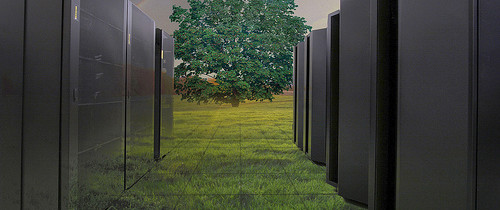Big Data, for the Environment
Devices that can help homeowners cut their electric bills and get to work on less fuel are getting easier to use, thanks to better data, according to Sheeraz Haji, chief executive of Cleantech Group, the research consultancy sponsoring the annual gathering. To make products smarter and more accessible to individual consumers, devices are being coupled with digital networks and analytical tools—think of Nest Labs Inc.’s smart thermostat, a product that helped prompt Google Inc. GOOG -0.40% to buy the company last January for $3.2 billion. But investors appear to be following the smaller trend. The amount of venture capital that flowed globally into clean-technology firms dropped 15% during 2013, to about $6.8 billion, according to Cleantech Group. Even so, the focus on savings should be a hit with consumers, Mr. Haji said.
Opower Inc. of Arlington, Va., works with utilities to help their customers cut electricity use and bills. The company, which filed regulatory documents earlier this month to go public, uses cloud-based software to read utility customers’ power meters and offer them tips for dialing back their electricity consumption. Opower Chief Executive Dan Yates is scheduled to speak at the conference, which is being held Tuesday, Wednesday and Thursday at the Fairmont San Francisco Hotel.
Some clean-tech startups are using crowdsourcing, crowdfunding or both to launch new types of businesses, in a similar vein as vacation-rental and couch-surfing site Airbnb Inc., which will also be featured at the conference. Clean-tech offshoots of this model include Mosaic, an Oakland, Calif., company that raises money on the Internet to finance rooftop solar-panel projects. San Francisco’s RidePal runs private luxury buses, complete with Wi-Fi, that shuttle workers to and from their offices. The share-taxi-type buses mimic the Google buses that ferry employees daily between San Francisco and the Internet giant’s Mountain View, Calif., headquarters. Anyone can ride RidePal buses, and employers can contract with RidePal to pay for their employees’ commutes.
The conference will also feature DriveNow, a division of BMW AG BMW.XE -0.45% , which offers a car-sharing service that allows drivers in the San Francisco area to rent an all-electric BMW for a joining fee, $12 for the first 30 minutes and then 32 cents a minute thereafter.
The Cleantech Forum is expected to draw at least 700 people, including a range of investors from Silicon Valley venture-capital firms Kleiner Perkins Caufield & Byers, Khosla Ventures and DBL Investors, as well as oil companies ConocoPhillipsCOP +0.18% and Royal Dutch Shell RDSB.LN +0.84% PLC.
It might seem counterintuitive for traditional fossil-fuel companies to show up at a clean-tech conference, Mr. Haji said, but they’re digitizing oil fields to get better data on where oil, gas and other resources are located underground. Oil companies are also investing in technology and services that allow them to treat the water used in oil exploration in the field, instead of trucking or piping it elsewhere, he said.
FilterBoxx Water & Environmental Corp., based in Calgary, Alberta, for example, builds portable water-supply and wastewater treatment plants for oil and gas drillers and pipeline operators. The company also makes portable drinking-water treatment plants for small towns, resorts and aboriginal communities.
The Technology Ventures division of ConocoPhillips has made direct investments in roughly a dozen tech companies, according to the company’s website. The oil company is directing capital to startups including 1366 Technologies of Bedford, Mass, which is developing low-cost solar-panel manufacturing, and biofuel maker Cool Planet Energy Systems of Greenwood Village, Colo. Cool Planet uses trucks to bring small, portable processing plants right to farmers’ fields so plant material like corn leaves and stalks can be turned into renewable fuel.
Fonte: wsj.com



